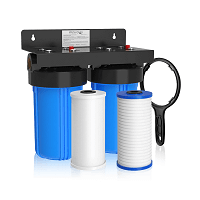It is easy for individuals to assume that well water is as safe to consume as filtered water. The fact of the matter is, though, that it can be as dangerous as tap water, or worse. Industrial and agricultural runoff, and other factors, can impart various contaminants into the well, and resulting water. Your safest bet is to install a filtration system specifically designed to treat well water, in order to provide safe drinking water to your household. The best way to go about this, is to test your water, and opt for a purification system setup specifically for the needs of your well water.
Due to the individualistic needs of well water, the system utilized by one household is not the same as the next. This is because the water in another well may contain differing contaminants, and suffer from varying runoff, and more. If you are the happy owner of a well, and are concerned with contaminants, and hidden dangers lurking within, a well water filtration system might be for you. Continue reading if you’d like to learn more about how you can filter your well water at home.
Before Purchasing Your Well Water Filtration System
Making an investment as serious as a well water filtration system is not a decision that should be taken lightly. It’s best to begin by getting your well water tested, if only to become better educated on its contents. The results will provide you with insight into contaminants, and other potential problems lurking within your well.
If you’d like, simply purchase a water testing kit, and follow the included directions. For a more detailed analysis, many labs accept mailed in samples for a deeper look into the contents of your well water. Local water companies also offer water testing services, for a small fee. According to the Centers for Disease Control and Prevention, or CDC, it’s recommended to conduct an annual well water test.
Things to Consider Before Choosing a Well Water Filtration System
When you begin shopping for your initial well water filtration system, you should take a few various factors into consideration. These details may include contaminants, mineral content, and other issues lurking within your well water. Flow rate, filter type, and filter size should also be taken into consideration, if only to provide for the needs of your household.
Various Contaminants
Contaminants and capacity are the most important details for choosing the most appropriate water filtration system. In this way, you can purchase a system that filters out various contaminants, supplying a regular supply of clean drinking water. Though many filtration systems are designed to remove contaminants such as heavy metals, others are made to filter out bacteria or total dissolved solids. This further highlights the importance of discovering the contaminants of your well water, especially before making your initial investment.
Choosing Your Next Filter
Whether you are choosing between a whole house system, an RO unit, or simple water pitcher filter, the choices are close to endless. Some situations may be so crucial, that the use of a UV filter is required. However, there are more simple methods for filtering out contaminants, such as an activated carbon block, which works well for organic chemicals, and even lead. Serious well water conditions may also require the use of mult-stage Reverse Osmosis systems, in order to dig deep and remove potentially dangerous contaminants.
Determining a Filter Size
Water filtration systems utilize different filter sizes, which plays an important role in the long term storage of your filtration unit. Smaller units may fit well under the sink, whereas others sit on the counter, or attach in the garage where the water line enters the home.
Many filtration systems measure in over 50” tall, whereas comparable units less than 30” tall. The overall filter size plays a role in determining the amount of water it is capable of purifying, before the unit requires a filter change. Before purchasing your unit, most manufacturers provide a recommended timeline for installing a new filter cartridge. It’s highly recommended that you strictly adhere to these recommendations, in order to get the expected lifespan out of your unit.
Generally speaking, most water filters require a change every 3 to 6 months. Although some manufacturers suggest replacements every 3 months, others suggest 9 month intervals, or even 12 months. This timeline is highly dependent upon the type of filter being utilized, in addition to the amount of water filtering through the cartridge, as well as the amount of contaminants being removed.
Water Flow Rate
Water filtration systems have a designated flow rate, which refers to the amount of water any system can filter at given time. This detail is typically measured in gallons per minute, or GPM. Most whole-house filtration systems feature 7 GPM, whereas others have a 15 to 20 GPM capability. Your home may require a specific flow rate, which highlights the importance of checking before purchasing.
Simply collect and measure the amount of water that comes out of any given faucet throughout your home. For 10 seconds, collect water in a 5 gallon bucket under full-pressure conditions. Multiply the number of gallons successfully collected by 6, which provides the supplied gallons per minute. On average, most homes have a flow rate requirement of 6 to 12 GPM. This depends on the size of your home, as well as the amount of residents.
Built-In Water Softeners
If a built-in water softener is something that appeals to you, it may be of interest to know that many whole-house filter systems provide an integrated softener. Because hard water conditions mean high mineral contents, it is best to protect against it if only to preserve the longevity of appliances and pipes.
These softeners are either salt-based, or salt-free. Well water filtration units offering built-in water softeners, typically feature a salt-free method in order to condition your water parameters. While softeners are incapable of demineralizing well water, they do soften it in an effort to prevent the buildup of minerals such as calcium.
Top Recommended Filter System
Waterdrop WHF21-PG 5 Micron 2-Stage Whole House Water Filtration System
The 2-stage Waterdrop whole house water filtration system acts as an initial line of defense for your household’s water. This better enables you to provide pure water to your family, free of potentially dangerous contaminants commonly found in well water. Through the use of natural coconut shell, the Waterdrop Filtration System removes sediment, rust, grit, silt, and dirt. Activated carbon neutralizes the odors and flavors imparted by chlorine.
Waterdrop’s overall structure provides a firm, durable housing that will last for years to come. This system has undergone various, thorough testing, made to withstand up to 300 PSI pressure, without threat of cracking and bursting. Furthermore, it has been found to pass up to 100,000 water hammer tests.

